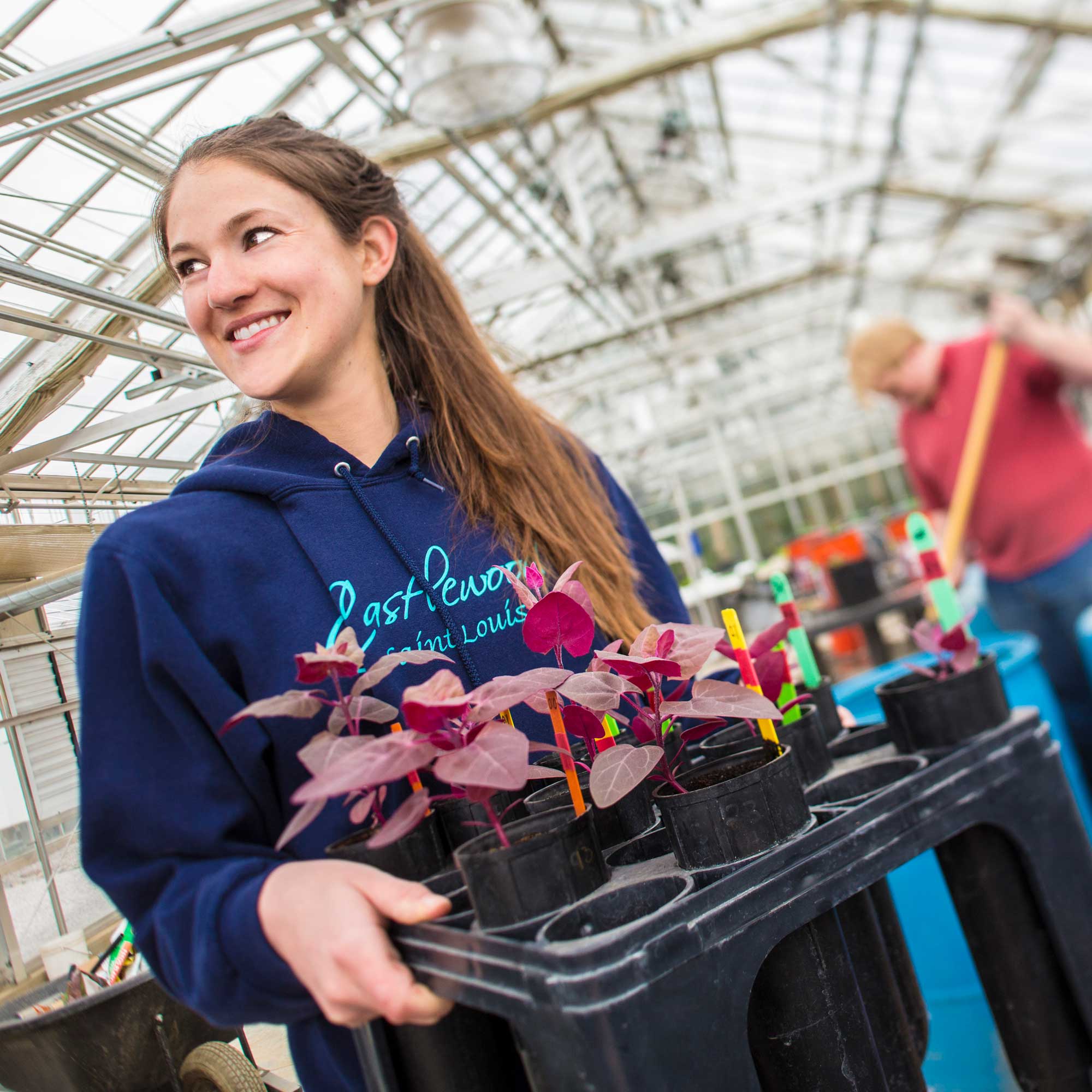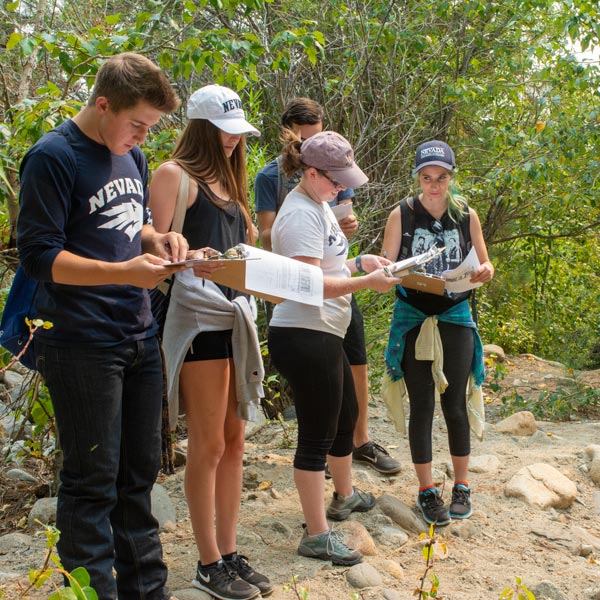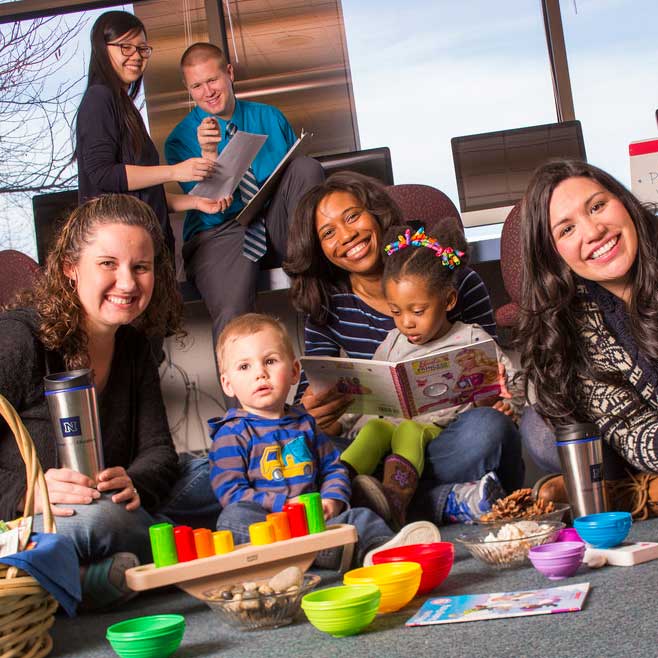In this edition
- Hallowed ground: Spring Commencement returns to the Quad
- Meet our College's Class of 2022
- University honors its best in two awards ceremonies
- Extension and partners offer sessions on preparing for wildfire and evacuations
- Study sheds light on what influences water supplied by snowmelt
- 4-H Offering summer camps at Lake Tahoe to keep youth engaged and learning
About our College
A founding college of the University, we have a long tradition of excellence in teaching, research and engagement programs that benefit the health and economic vitality of Nevada. We offer programs in:
- agriculture, horticulture, rangeland and veterinary sciences
- biochemistry and molecular biology
- children, youth and families
- community and economic development
- health and nutrition
- natural resources and environmental science
Hallowed ground: Spring Commencement returns to the Quad
College celebrates the awarding of more than 150 degrees
Spring Commencement Ceremonies made a triumphant return to the Quad May 12-14, where our University conferred more than 150 degrees from our College and more than 3,000 degrees overall.
At the event, President Brian Sandoval said, "Today we restore this wonderful University tradition of being on the Quad to celebrate all of you. The Quad is part of that silver thread that connects all of our graduates. It’s been three years since a graduate walked this hallowed ground. And to get here, you never wavered."
Sandoval told the graduates that the power and potential for transformation that lies in having worthy dreams still is strong for all people.
Empowering innovators to make a difference
"We need innovators, thinkers, collaborators and leaders like all of you. You can never put a price on your vision, intellect and experience, which you’ve honed during your time with us … All of you, all of the Class of 2022, have it within you to make this difference." -President Brian Sandoval
Meet our College's Class of 2022
Senior Scholar Kendall Warnock
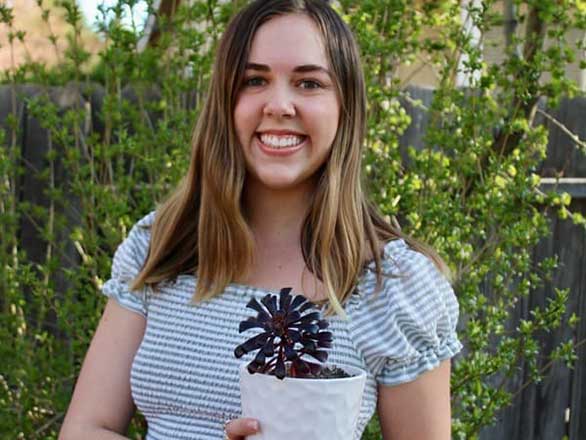
Kendall chose to attend our University because she fell in love with the campus during Nevada Bound. She thought the grounds were gorgeous, and she liked the campus and Reno atmosphere. Even though our city is much bigger than her hometown, she said it feels like a small, caring community.
Kendall decided to major in biochemistry and molecular biology because she had always wanted to be involved in research and loved learning about biochemical pathways. She hopes to go on to medical school.
When asked about her favorite college memory, Kendall said, "Almost all are from long nights in the Knowledge Center with friends, studying or going on late-night adventures to get food. We were there until close many nights, and I can’t help but smile when I remember these times."
By the numbers
156
GRADUATES
4
SUMMA CUM LAUDE
3
MAGNA CUM LAUDE
13
CUM LAUDE
33
AGRICULTURE, VETERINARY & RANGELAND SCIENCES MAJORS
40
BIOCHEMISTRY & MOLECULAR
BIOLOGY MAJORS
59
NATURAL RESOURCES & ENVIRONMENTAL SCIENCE MAJORS
24
NUTRITION
MAJORS
We're proud of our students
Here are a few of their stories
Undergraduate researcher and McNair Scholar reflects on impressive academic journey
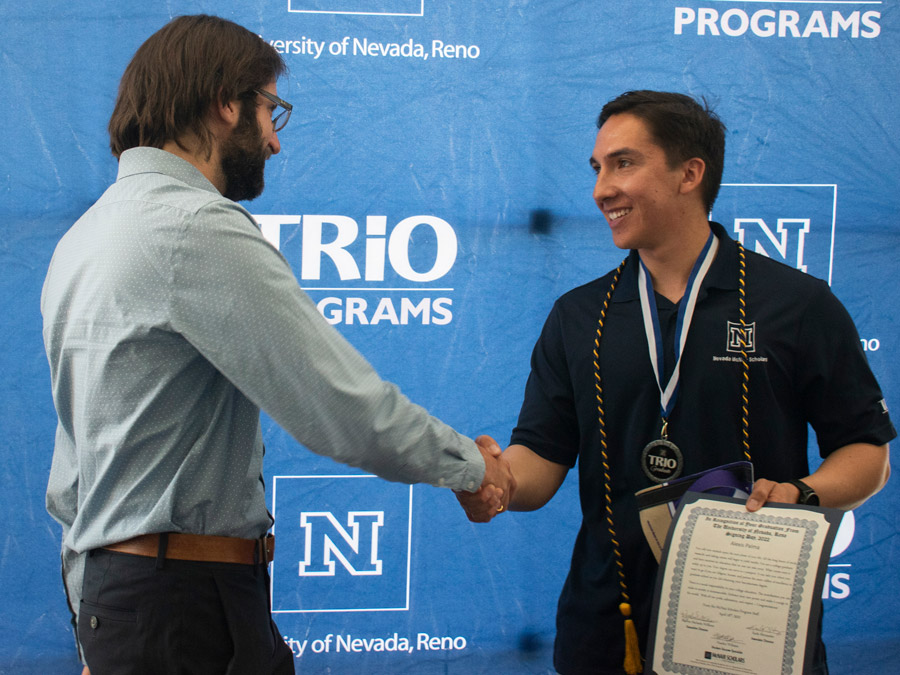
“Research in the lab changed the trajectory of what I wanted to do after college,” biotechnology student Alexis Palma said. "When I was a freshman, I was thinking I can be the first person in my family to get a degree, but then I felt like 'oh man, I actually really enjoy research, maybe I can go on and get an even higher degree.'"
First-generation student becomes first at University to earn prestigious fellowship
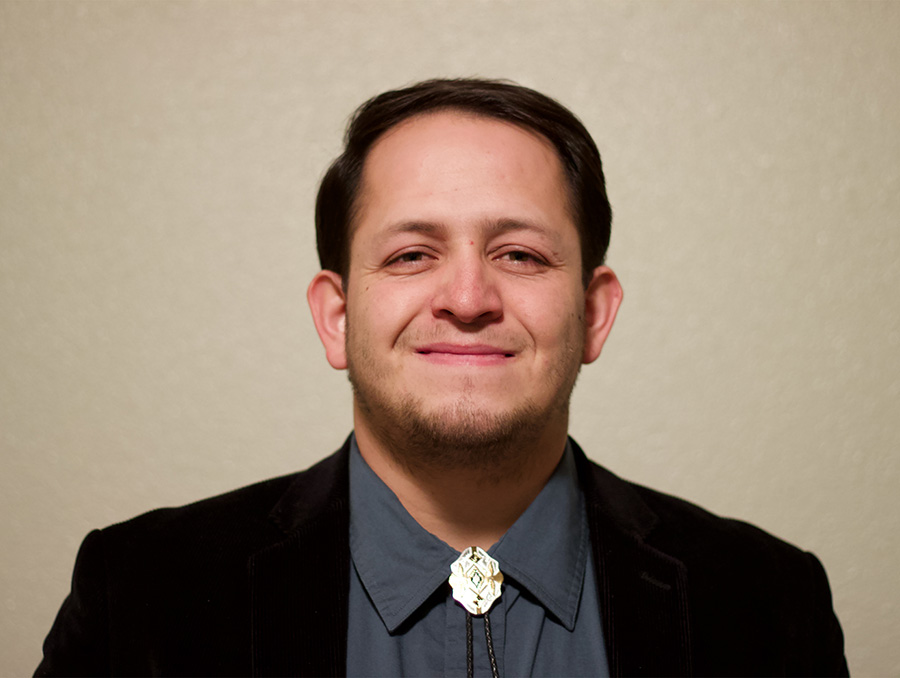
"This fellowship means that I’m able to join this wonderful community of some of the most influential immigrants in the United States,” animal and rangeland sciences student Arturo Macías Franco said. “It’s exciting to be part of this alongside researchers in many different fields across the country.”
Faces of the Pack: Blesethe West challenges herself by pursuing undergraduate research

"I'm a self-doubter," nutrition student Blesethe West said. "But I saw that the Pack Research Experience Program (PREP) was specifically for freshmen and sophomores and encouraged participation of underrepresented communities. I didn't think that I would get it, but I told myself I can still try."
Are you a student or alumni with us?
University honors its best in two awards ceremonies
Students, employees and friends celebrated at College's Spring Awards and University's Honor the Best ceremonies
Honor the Best
"The deep sense of community that runs through our campus truly defines us as a special place where achievement is measured in lives that are transformed by the important work that all of you are doing. Each and every one of you, throughout this past year, have shown why our University is such a special place. Your commitment to changing our world every day only deepens. The depth of character that you demonstrate on behalf of the University is a reservoir that we draw upon every day. Thank you for a great academic year."
-President Brian Sandoval
Spring Awards
"The accomplishments we celebrate tonight are representative of a lot of hard work by you all, and the passion you have for what you do, and what we are trying to do as a College. I couldn’t be more proud and want to sincerely thank you all for your excellence in learning and teaching in our classrooms; in research in our labs, fields and Experiment Station facilities; and in providing meaningful impacts in Nevada communities with Extension programming. I hope you enjoy the evening and sharing in each other’s successes."
-Dean Bill Payne
Extension and partners offer sessions on preparing for wildfire and evacuations
Extension continues Nevada Wildfire Awareness Campaign
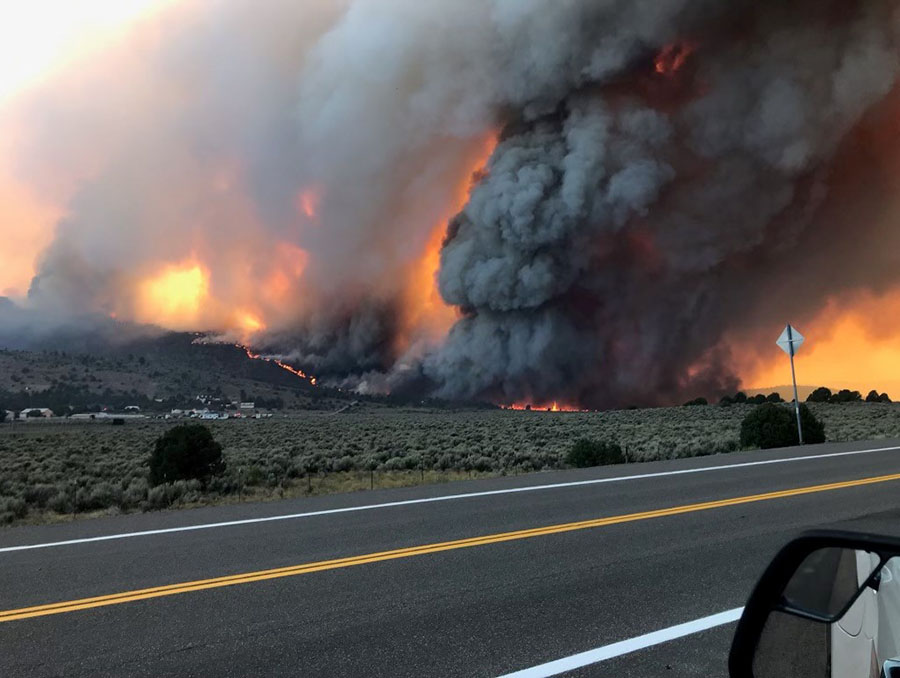
The Tamarack Fire rages, threatening homes last summer. It burned over 68,000 acres in Nevada’s Douglas and Lyon Counties, and California’s Alpine County. Photo by Estelle Whalen.
Already this year, more than 25,000 wildfires in the U.S. have burned over 1.3 million acres, equating to 2,000-plus square miles. This month, 20 homes in Southern California’s coastal town of Laguna Niguel burned to the ground, and prompted hasty evacuations by residents of 900 homes. To help Nevadans prepare for wildfire and evacuations, Extension’s Living With Fire Program and numerous partners are offering two “Preparing for Wildfire and Evacuation” sessions, both in person and online, as part of the Nevada Wildfire Awareness Campaign.
The events are June 7 and June 16, with the first geared for residents of Douglas County’s Topaz Ranch Estates, and the second for Elko County’s Spring Creek community. Both areas face significant wildfire risk and challenges. While some event information is specific for those communities, other event information, such as packing a go-bag and evacuating animals, can be applicable for other communities.
Extension and its Living With Fire Program partners will hold more Nevada Wildfire Awareness Campaign events through October. Recent campaign events educated Las Vegans on reducing ozone and wildfire smoke impacts, preparing for wildfire and evacuation, and the wildfire threat at Mount Charleston.
In addition, Extension and partners have worked to provide residents with a Wildfire Evacuation Checklist and other publications.
Nevada receives $20 million National Science Foundation research award for fire science
The Nevada System of Higher Education has been awarded $20 million over five years to increase the state's capacity for wildland fire research, education and workforce development, and to demonstrate this increased capacity through technology-enhanced fire science in the regionally important sagebrush ecosystem.
Assistant Professor in our College Erin Hanan is a part of the research project and will provide expertise on fire ecohydrology and modeling.
Keeping Nevadans safe
“I know firsthand how scary it is for my family and neighbors when wildfires threaten our community. We have only limited ways to get in and out. But, if we all get informed and prepared before a wildfire threatens our community, I think we can keep everyone safe.” – Extension Educator Jill Baker-Tingey
Study sheds light on what influences water supplied by snowmelt
University leads study looking at over 500 locations in the U.S.
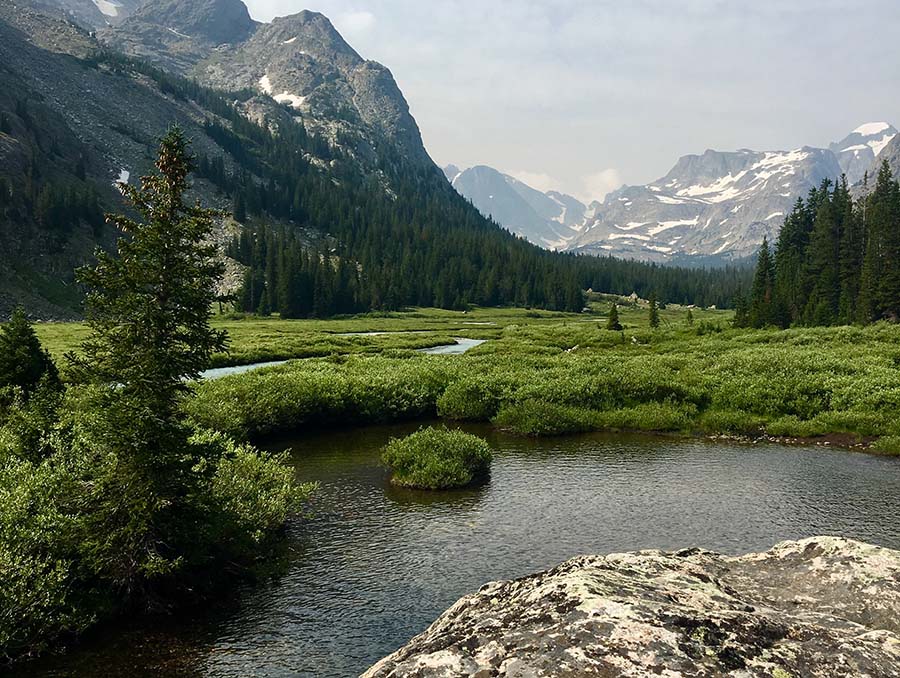
Snow and glacial melt from the Wind River Mountains in Wyoming feeds the Wind River via Dinwoody Creek. Photo by Beatrice Gordon.
In the Western U.S., the majority of surface water is from mountain snow that melts and flows down to urban and rural communities. More than two-thirds of reservoir inflows are from snow, and roughly 40 million people, and much of the most agriculturally productive land, rely on two snowmelt-fed reservoirs. There is a lot of uncertainty in forecasting those water supplies, which makes meeting the needs of a growing population challenging for water managers. A new study led by researchers in our College with support from our Experiment Station unit will help.
“Our goal,” study lead author and Graduate Researcher Beatrice Gordon said, “was to provide other scientists and water managers with a simple, but powerful framework that can be used to improve predictions about the timing and amount of streamflow as climate change accelerates.”
The framework is centered around three factors:
- How much of the total winter snowfall is available at the end of the winter
- How fast snow melts
- When snow melts
The research team, which included Associate Professor Adrian Harpold, also found that the relative importance of these factors for mountain water supplies varies geographically. The team is focusing its next efforts on understanding how these streamflow changes impact agriculturally dominated basins, including the Walker River Basin, which supplies water for agriculture in Nevada.
Providing critical information to decision-makers
“As someone who grew up in agriculture in the Western U.S., I know how much snow matters to our farming and ranching communities. And I’m excited to see how the work coming out of the team provides critical information to decision-makers who are currently grappling with these changes in our mountain water supplies.” – Graduate Researcher Beatrice Gordon
4-H Offering summer camps at Lake Tahoe to keep youth engaged and learning
Extension continues tradition of offering overnight camps
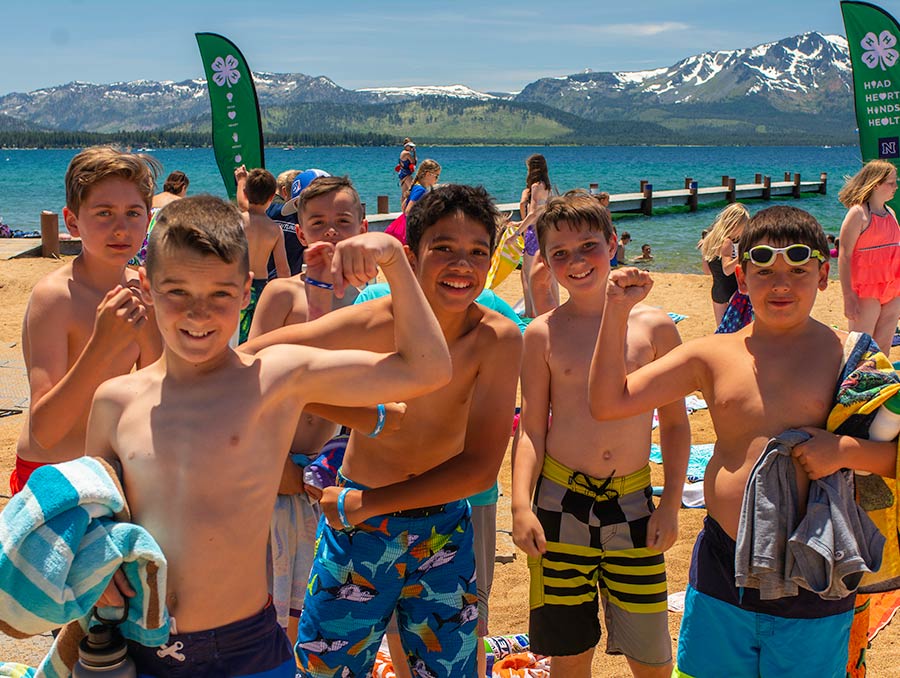
Youth at the Nevada State 4-H Camp enjoy activities on the shores of Lake Tahoe at summer camp last year. Photo by Robert Moore.
In addition to the many ongoing local 4-H club and youth activities that are happening across the state, the Nevada 4-H Youth Development Program also is offering residential camps for youth this summer, following a Nevada tradition that goes back 80 years. The overnight camps will all be held at the Nevada State 4-H Camp in Stateline, Nevada. The 32-acre camp sits on the south shore of Lake Tahoe and is owned and operated by the University.
The Nevada 4-H camping programs, offered by Extension, have a rich history of providing educational programming to thousands of youth annually through hands-on, experiential learning. 4-H camping is cooperative group living that focuses on the individual's social, spiritual, mental and physical development for youth. Youth build lifelong memories and friendships at the camp, as well as learn life, leadership and citizenship skills.
The four camps being offered at the Nevada 4-H State Camp this year are:
- Health 4 Happiness 4-H Camp, July 6 – 9, for youth ages 11 – 13
- Northern/Western Nevada 4-H Camp, July 10 – 16, for youth ages 9-12
- Central Nevada 4-H Camp, July 17 – 21, for youth ages 9-13
- Mineral County / Native American Reservations 4-H Camp, Aug. 2 – 6, for youth ages 9-13
Along with taking applications for youth campers, Extension's 4-H Program is also taking applications for adult volunteers to serve as chaperones for the camps.
New summer camp aims to help American Indian youth get college ready
Native American Indian youth make up a small percentage of students attending college and completing degrees. To help address this disparity, Extension is hosting a new, week-long summer camp for high school-aged youth and incoming college freshman to provide resources and support aimed at getting more of these students on a path to attend college and earn degrees.
At Nevada State 4-H Camp June 6-10, teens will explore Nevada tribal careers and learn about the University, the application process, obtaining financial aid and college life.
Providing unparalleled hands-on outdoor learning
“The setting provides an unparalleled opportunity for outdoor environmental education and STEM-related, hands-on learning activities. There’s also plenty of time for 4-H campers to participate in and learn about healthy, physical activities, such as shooting sports, kayaking, swimming and more.” – Extension State 4-H Camp Education Program Coordinator Kenny Haack-Damon
Innovating for Nevada
Our programs work together to make an impact
Our teaching, research and engagement programs are intertwined and complement one another. Faculty who teach on campus also conduct research as part of our Experiment Station, allowing students to learn about and participate in research. Extension faculty engaging with communities identify research needs, as well as join Experiment Station faculty to conduct research. Faculty on campus help to develop Extension programs in communities.
